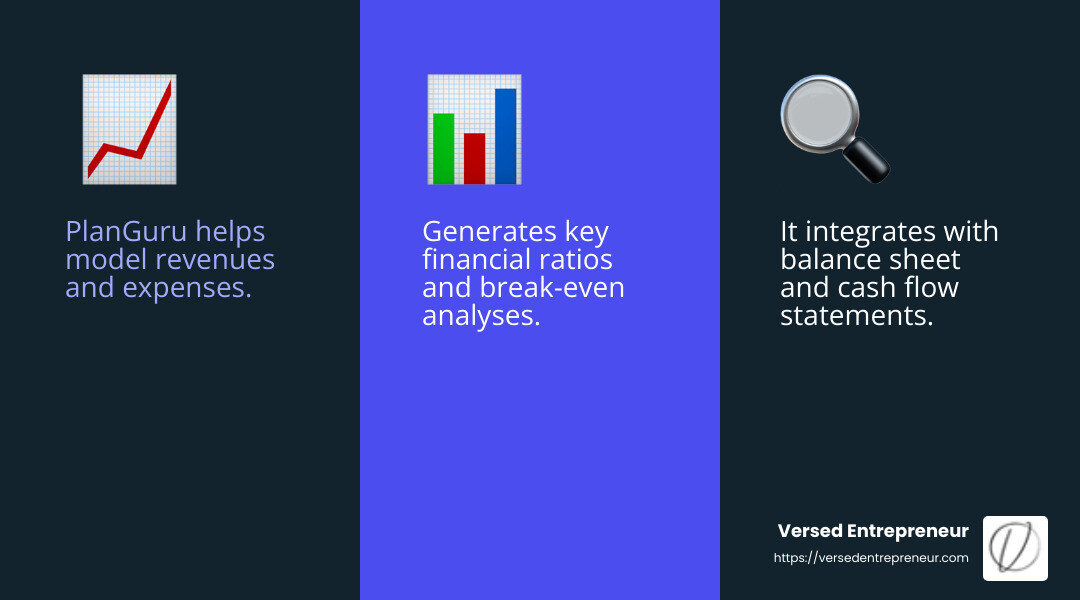Table of Contents
ToggleThe Key to Entrepreneurial Success: Financial Planning
Entrepreneur financial planning is crucial for anyone aiming to achieve business success. At its core, it involves managing both personal and business finances strategically. This ensures that you, as an entrepreneur, are prepared for unexpected challenges and can seize opportunities as they arise.
To get you started, here are immediate steps to improve your entrepreneur financial planning:
- Create a Business Plan: Incorporate a personal financial budget.
- Understand Financial Goals: Clearly define what you want to achieve.
- Monitor Finances Regularly: Keep a close eye on personal and business cash flows.
- Prepare for Retirement: Set aside funds early to ensure a secure future.
The excitement of entrepreneurship often overshadows the need for practical financial planning. But neglecting this can lead to unnecessary problems, such as difficulty in securing loans or partners. On the other hand, disciplined financial planning provides immense benefits, like streamlined operations, better investment opportunities, and peace of mind.
As an experienced entrepreneurial educator and the founder of a successful education company, I understand the nuanced challenges of managing both business and personal finances. I’ve seen how proactive financial planning can pave the way for sustainable growth and stability.
Feel free to read on to dive deeper into these critical financial strategies.
This article is informational and not a substitute for professional advice. Always consult a financial advisor for personal advice.
Understanding Financial Planning for Entrepreneurs
Importance of Financial Planning
Financial planning is essential for entrepreneurs. It helps you manage your money, prepare for the future, and grow your business.
Think of it as creating a roadmap for your finances. This roadmap guides you from your current financial situation to your future financial goals. Without it, you might find yourself lost or facing unexpected challenges.
Why is financial planning so important for entrepreneurs?
- Clarity on Financial Goals: Knowing what you want to achieve financially helps you make better decisions. Whether it’s expanding your business or saving for retirement, clear goals keep you focused.
- Better Decision Making: With a solid financial plan, you can make informed decisions about investments, expenses, and savings.
- Preparedness for Challenges: Financial planning helps you prepare for unexpected events like market downturns or personal emergencies.
- Improved Business Growth: By managing your finances well, you can reinvest in your business and take advantage of growth opportunities.
Key Components of a Financial Plan
Creating a comprehensive financial plan involves several key components. Each plays a vital role in ensuring your financial health and business success.
Budgeting
Budgeting is the foundation of any financial plan. It helps you track your income and expenses, ensuring you live within your means.
- Track Income and Expenses: Use tools like Wave or QuickBooks to keep accurate records.
- Set Spending Limits: Define how much you can spend on different categories like marketing, payroll, and personal expenses.
- Adjust as Needed: Regularly review and adjust your budget to reflect changes in your financial situation.
Savings
Savings are crucial for both personal and business stability. They provide a cushion for unexpected expenses and future investments.
- Emergency Fund: Set aside money for emergencies. Aim for at least three to six months of living expenses.
- Business Reserves: Maintain a reserve fund for your business to cover unexpected costs or opportunities.
- Retirement Savings: Plan for your future by contributing to retirement accounts like a SEP IRA or individual 401(k).
Investment
Investing helps your money grow over time. It’s essential for building wealth and achieving long-term financial goals.
- Diversify Investments: Spread your investments across different asset classes to reduce risk.
- Regular Contributions: Make consistent contributions to your investment accounts.
- Seek Professional Advice: Consider working with a financial advisor to create an investment strategy custom to your goals.
Risk Management
Risk management protects you from potential financial losses. It includes insurance and other strategies to safeguard your assets.
- Personal Insurance: Ensure you have adequate health, life, and disability insurance.
- Business Insurance: Protect your business with property, liability, and business interruption insurance.
- Legal Structures: Choose the right legal structure for your business to protect personal assets from business liabilities.
Read on to find actionable steps for creating your financial plan.
Steps to Create a Financial Plan
Creating a financial plan is like building a strong foundation for your entrepreneurial journey. Here are the essential steps:
Assessing Your Financial Situation
Before you can plan for the future, you need to understand where you stand today. This involves taking a close look at your current finances.
1. Evaluate Your Income and Expenses:
- Income: List all sources of income, including business revenue, investments, and any other earnings.
- Expenses: Track all your expenses, both personal and business-related. Tools like Wave or QuickBooks can help you keep accurate records.
2. Identify Your Assets and Liabilities:
- Assets: Include everything you own that has value, like cash, property, and investments.
- Liabilities: List all your debts, such as loans, credit card balances, and any other obligations.
Knowing your net worth (assets minus liabilities) gives you a clear picture of your financial foothold.
Defining Financial Goals
Setting clear financial goals is crucial. They guide your planning and decision-making.
1. Short-Term Goals:
- Examples: Paying off a small business loan, building an emergency fund, or increasing monthly savings.
- Time Frame: Typically within one year.
2. Long-Term Goals:
- Examples: Saving for retirement, buying property, or expanding your business.
- Time Frame: More than one year, often several years or decades.
3. Personal and Business Goals:
- Personal: Retirement savings, children’s education fund, or personal investments.
- Business: Revenue targets, market expansion, or new product development.
Researching Financial Strategies
Once you have your goals, research strategies to achieve them.
1. Investment Options:
- Diversify: Spread investments across different asset classes like stocks, bonds, and real estate.
- Regular Contributions: Make consistent contributions to your investment accounts.
- Professional Advice: Consider consulting a financial advisor for custom investment strategies.
2. Savings Plans:
- Emergency Fund: Aim to save three to six months of living expenses.
- Business Reserves: Maintain a reserve fund for unexpected business costs.
- Retirement Accounts: Look into options like SEP IRAs or individual 401(k)s.
3. Insurance Products:
- Personal Insurance: Ensure adequate health, life, and disability insurance.
- Business Insurance: Protect your business with property, liability, and business interruption insurance.
Implementing Your Financial Plan
Turning your plan into action involves clear steps and timelines.
1. Action Steps:
- Budgeting: Use tools to track income and expenses, and set spending limits.
- Savings: Set up automatic transfers to your savings and retirement accounts.
- Investments: Regularly review and adjust your investment portfolio.
2. Timelines:
- Short-Term Goals: Set monthly or quarterly milestones.
- Long-Term Goals: Establish annual or multi-year targets.
3. Responsibilities:
- Delegate: Assign tasks to team members if needed.
- Monitor: Regularly check progress and make necessary adjustments.
Monitoring and Evolving Your Plan
A financial plan is not static. It needs regular reviews and adjustments.
1. Regular Reviews:
- Monthly: Check your budget and cash flow.
- Quarterly: Review your savings and investment performance.
- Annually: Evaluate overall progress towards long-term goals.
2. Adjustments:
- Reallocate Investments: Based on performance and market conditions.
- Update Goals: As your business and personal circumstances change.
- Consult a Financial Advisor: For professional guidance on significant adjustments.
Read on to find essential financial tools for entrepreneurs.
Essential Financial Tools for Entrepreneurs
As an entrepreneur, having the right financial tools can make a world of difference. These tools help you manage your finances efficiently, forecast future trends, store important documents, and make informed decisions about big purchases. Here are some of the essential financial tools you should consider:
Bookkeeping Tools
Keeping accurate financial records is crucial for any business. Bookkeeping tools help you track your income and expenses, generate invoices, and manage payroll. Here are some top choices:
-
Wave: Wave is a comprehensive, free bookkeeping tool. It allows you to track transactions, create invoices, and manage payroll (for a fee). It’s ad-supported, which keeps it free for most features.
-
FreshBooks: FreshBooks offers similar functionality to Wave but with a focus on ease of use. It’s great for small businesses and freelancers who need a straightforward accounting solution.
-
QuickBooks: QuickBooks is one of the most popular bookkeeping tools. It’s not free, but it offers extensive features and is scalable as your business grows.
Forecasting Tools
Forecasting tools help you plan for the future by modeling revenues and expenses. They can be invaluable for making informed business decisions.
- PlanGuru: PlanGuru is a powerful forecasting tool that helps you model revenues and expenses. It integrates with your balance sheet and cash flow statements, generating key financial ratios and break-even analyses. While there is an upfront cost, you can try it free for 30 days to see if it fits your needs.
Document Storage Solutions
Storing financial documents securely and accessibly is essential. Going paperless can save you time and reduce clutter.
- FileThis: FileThis automatically collects and organizes bills, tax forms, receipts, and other financial documents. For $5/month, you get up to 10GB of cloud storage from up to 30 different sources, making it a great choice for small businesses.
Buy or Lease Calculators
Deciding whether to buy or lease an asset can be complex. Online calculators can simplify this decision by breaking down the costs.
- CalcXML: CalcXML provides an excellent buy or lease calculator. You can input key data points, and it will generate a detailed breakdown of the costs for each option, complete with a visual graph.
This article is informational and not a substitute for professional advice. Always consult a financial advisor for personal advice.
Read on to learn about financial considerations when starting a business.
Financial Considerations When Starting a Business
Starting a business is an exciting journey, but it comes with many financial considerations. Let’s explore some key areas you need to focus on: startup costs, funding options, tax considerations, and retirement planning.
Startup Costs and Funding Options
Before you launch your business, it’s crucial to understand your startup costs. These can include legal fees, marketing expenses, equipment, and more. Use a startup cost calculator to estimate how much you’ll need.
Funding options play a significant role in how you cover these costs. Here are a few:
-
Angel Investors: These are individuals who provide capital for startups, often in exchange for equity. According to Pitchbook, the median deal size for startups raising a seed round between 2020 and 2023 was $3.9 million.
-
Crowdfunding: Platforms like Kickstarter allow you to raise small amounts of money from a large number of people. This can be a less risky way to gather funds without giving up too much control.
-
Small Business Loans: The Small Business Administration (SBA) offers various loan programs. These loans can be a good option but often require a solid business plan and good credit.
Tax Considerations
When running a business, you need to be aware of several types of taxes:
-
Income Taxes: Different business structures (C corporations, S corporations, LLCs, sole proprietorships, and partnerships) have different tax obligations. For instance, C corporations are taxed separately from their owners, while S corporations are pass-through entities.
-
Self-Employment Taxes: If you are self-employed, you’ll need to pay self-employment taxes, which cover Social Security and Medicare.
-
Business Property Taxes: If you own property for your business, you’ll be subject to local property taxes.
Understanding these taxes can help you plan better and avoid surprises. For more details, visit the IRS Business Taxes page.
Retirement Planning for Entrepreneurs
Planning for retirement is crucial, even when you’re self-employed. Here are some popular options:
-
Individual 401(k): This plan is ideal for solo entrepreneurs. It allows you to contribute both as an employer and an employee, maximizing your savings.
-
SEP IRA: The Simplified Employee Pension (SEP) IRA is another great option. It is easy to set up and allows for substantial contributions.
-
Employer-Sponsored Plans: If you have employees, consider setting up a retirement plan like a SIMPLE IRA or a SIMPLE 401(k). These plans not only help you save for retirement but also attract and retain quality employees.
Next, we’ll explore the importance of insuring your business to protect against unexpected risks.
Insurance and Risk Management
Insuring your business is vital to protect against unexpected risks. Here are some key types of insurance you should consider:
Types of Business Insurance
Property Insurance: This covers damage to your business’s physical assets, like buildings and equipment. If a fire or natural disaster strikes, property insurance can help you rebuild and recover.
Casualty Insurance: This type of insurance covers liability for injuries or damage your business causes to others. For example, if a customer slips and falls on your property, casualty insurance can cover medical expenses and legal fees.
Business Interruption Insurance: If your business can’t operate due to a covered event (like a fire), this insurance can replace lost income. It helps you pay ongoing expenses like rent and salaries while you get back on your feet.
Personal Insurance for Entrepreneurs
Life Insurance: This is essential for protecting your family and your business. If you pass away, a life insurance policy can provide funds to keep the business running or pay off debts. You can also purchase life insurance for key employees to cover the cost of replacing them.
Disability Insurance: If you become disabled and can’t work, disability insurance provides a portion of your income. This helps you cover personal and business expenses during your recovery.
Health Insurance: Health insurance is crucial for managing medical costs. As a business owner, you might offer group health insurance to your employees, which can also benefit you.
Liability Insurance
General Liability Insurance: This protects your business from claims of bodily injury, property damage, and personal injury (like libel or slander). It’s a must-have for any business to safeguard against lawsuits.
Commercial Umbrella Policy: If your general liability policy’s limits are reached, a commercial umbrella policy provides additional coverage. It’s a cost-effective way to increase your liability protection.
Lawsuit Protection: Liability insurance offers lawsuit protection by covering legal fees and settlements. This can be crucial for small businesses that might otherwise struggle with the financial burden of a lawsuit.
Next, we’ll explore essential financial tools for entrepreneurs to help you manage your business effectively.
Frequently Asked Questions about Entrepreneur Financial Planning
What is financial planning in entrepreneurship?
Financial planning in entrepreneurship involves creating a comprehensive roadmap to manage both your personal and business finances. It includes setting clear financial goals, budgeting, saving, investing, and risk management. A good financial plan ensures that you have the necessary resources to grow your business while also securing your personal financial future.
“Financial discipline is the foundation of any growing business.” This quote underlines the importance of maintaining a balance between personal and business finances. Neglecting personal financial planning can lead to unnecessary challenges, such as difficulty obtaining loans or financial partners.
Is a financial planner an entrepreneur?
While a financial planner is not necessarily an entrepreneur, they often exhibit entrepreneurial traits. Registered Investment Advisors (RIAs) typically run their own practices, manage client relationships, and steer the complexities of financial markets—much like entrepreneurs manage their businesses.
A great financial planner can also be a valuable partner for entrepreneurs, helping them steer the financial aspects of business growth stages and succession planning. They provide the expertise needed to make informed decisions that align with both personal and business financial goals.
What are the key steps in financial planning?
Here are the key steps in entrepreneur financial planning:
-
Assess Financial Foothold: Start by evaluating your current financial situation. This includes your income, expenses, assets, and liabilities. Tools like Wave can help you keep accurate financial records.
-
Define Financial Goals: Set clear short-term and long-term goals for both personal and business finances. This could be anything from saving for retirement to expanding your business.
-
Research Strategies: Investigate various financial strategies, such as investment options, savings plans, and insurance products. Tools like PlanGuru can help with revenue and expense forecasting.
-
Implement Your Financial Plan: Create an action plan with specific steps, timelines, and responsibilities. Use tools like CalcXML to make informed decisions, such as whether to buy or lease equipment.
-
Monitor and Evolve: Regularly review and adjust your financial plan to adapt to changing circumstances. Solutions like FileThis can help you keep all your financial documents organized and accessible.
This article is informational and not a substitute for professional advice. Always consult a financial advisor for personal advice.
Next, we’ll explore essential financial tools for entrepreneurs to help you manage your business effectively.
Conclusion
As entrepreneurs, we wear many hats and juggle numerous responsibilities. Among these, financial planning stands out as a cornerstone for both business success and personal financial well-being. At Versed Entrepreneur, we believe that a well-crafted financial plan can transform your entrepreneurial journey, turning challenges into opportunities and dreams into reality.
Financial planning is not just about crunching numbers; it’s about envisioning your future and laying down a roadmap to get there. By setting clear financial goals and employing disciplined financial strategies, you can ensure the long-term growth and stability of your business. The more efficiently you manage both your personal and business finances, the more productively you can move towards your objectives.
Here are a few key takeaways:
-
Assess Your Financial Situation: Regularly evaluate your income, expenses, assets, and liabilities. This helps in making informed decisions and identifying areas for improvement.
-
Define Clear Goals: Establish both short-term and long-term financial goals. This could range from saving for retirement to scaling your business operations.
-
Implement and Monitor: Create a detailed action plan and adjust it as needed. Use financial tools and consult with a financial advisor to stay on track.
-
Seek Professional Advice: A specialized financial advisor can provide invaluable insights and help you steer complex financial landscapes.
We hope this guide has shed light on the importance of entrepreneur financial planning and provided actionable strategies to help you succeed. For more resources and insights on investment options, visit our Investing page.
By taking control of your finances, you’re not just securing your future; you’re setting the stage for your business to thrive. Here’s to your entrepreneurial success and financial peace of mind!










